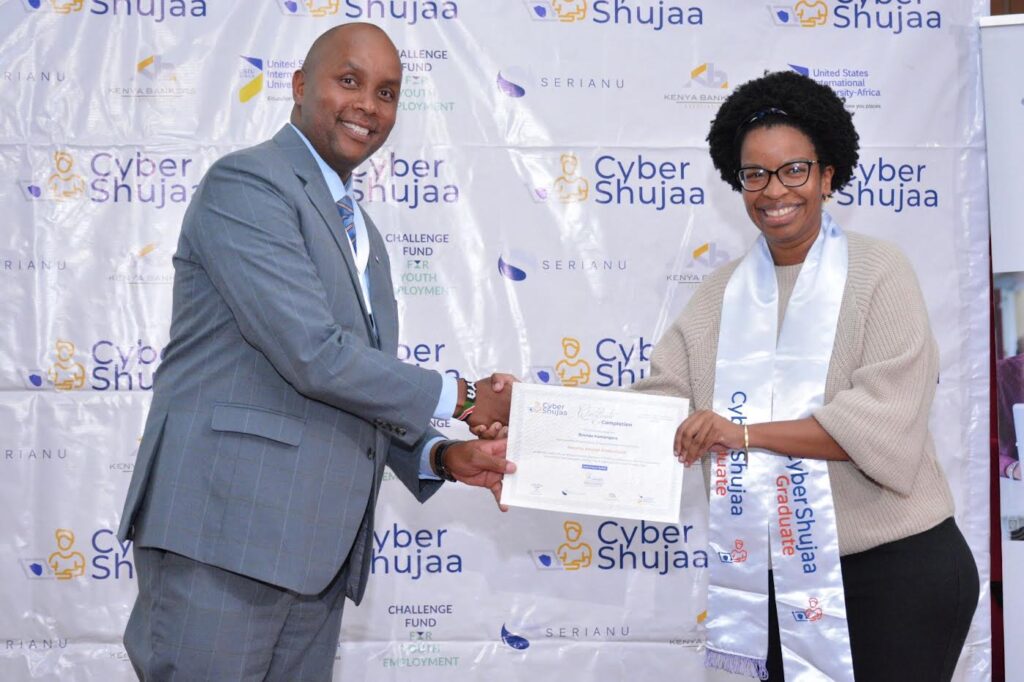Kenya’s Cyber Shujaa Program to Grow Population of Women Cybersecurity Professionals

Kenyan women will have a higher chance of joining the cybersecurity profession following an affirmative approach taken by the Kenya Bankers Association, Serianu and USIU in their novel Cyber Shujaa program. The initiative has been set up to bridge the training, placement and retention gap for the youth in cybersecurity to stem the rising tide of losses to cyber criminals, which could reach Kshs 10 billion per annum by end of 2022
With data showing that women hold only 20 percent of cybersecurity jobs, Cyber Shujaa is scaling up the population of women fighting cyber criminals by running women-only training tracks for each cohort of students. The program aims to train and place 2,000 Kenyan youth with half of them female by the end of 2023.
Speaking in Nairobi during the graduation of the second cohort of 160 Cyber Shujaa trainees, Kenya Bankers Association Director of Technical Services Fidelis Muia explained that the program had observed that very few women were enrolling for cybersecurity training and that less than 30 percent of Cyber Shujaa graduands were female, yet Kenya’s economy has the capacity to absorb 10,000 cybersecurity executives annually.
“Low female enrolment is a cause for concern because the field of information technology is expanding and more career paths are emerging in cybersecurity. We need more women to exploit their natural vigilance, dexterity and attention to detail, qualities that will help them tremendously in cybersecurity,” said Muia.
In addition to training the executives, Cyber Shujaa places the graduates with employers and works with those who want to go into enterprise to incubate their businesses at USIU where they learn about entrepreneurship.
Kenyan organizations have escalated their digitization programs progressively in recent years but at the same time, the depth and frequency of cyber attacks has been rising. Kabuthia Riunge, Group Head, Cybersecurity, KCB Bank Group noted that in 2021 cyber security attacks took place every 11 seconds compared to every 30 seconds the year before.
“Fortunately, this means that the demand for competent cyber security executives will continue for the foreseeable future. With Kenya’s unemployment standing at nearly 40 percent and organizations facing a dire need for qualified people, cybersecurity offers a number of roles such as cloud security and security analysts, data protection officers, auditors, vulnerability assessors, penetration testers, security operation center staff, incident responders, forensic investigators and data analysts among many others” said Riunge.
Joseph Mathenge, Serianu Chief Operating Officer added that Cyber Shujaa had illustrated that a partnership between the private sector, academic community and the public sector was possible and produces results as shown by the successful training of 289 young people including students from 32 universities and working executives from across the Kenya Bankers Association membership.
“While we encourage other sectors to emulate the model that we have in place, we need to emphasize that more women have an opportunity to become cyber security professionals with Cyber Shujaa,” he said.
This, said USIU-Africa Vice Chancellor Professor Margee Ensign, will be made possible through Cyber Shujaa’s mentorship, practical skills training and group support activities. “Our strategic focus is to align our curriculum with industry and government in order to solve national and global cybersecurity challenges,” she said, reiterating her commitment to the partnership as the academic and research partner to drive the youth engagement, curriculum development, training and immersion, data collection, analysis and policy-based research”, she posited.





